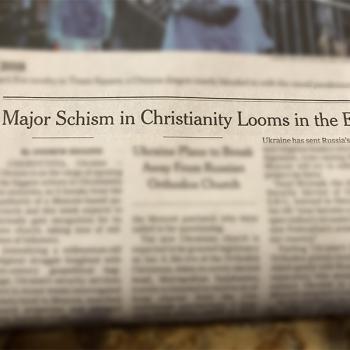On Clergy Supervision
A little discussed issue in the larger situation with Rev. Schaefer and the church trial: the nature and accountability of clergy supervision in our covenant.
Each year, clergy are asked to complete multiple forms relating to our work, our lives, and our particular appointments. One of those is something called a “personal profile” where we speak in particular of family situations and other personal factors that may affect pastoral effectiveness and the nature of clergy appointments.
According to one of the news stories I read, Rev. Schaefer did disclose in his 2006 personal profile that three of his children are gay and that he planned to preside over the wedding of his gay son. No secrecy here, no attempt at cover up. Schaefer, surely knowing even then that his decision was problematic, made no attempt to hide his plans from his District Superintendent and Bishop.
He did not disclose his plans to his church, but since the wedding was not held there, I personally can see no reason why he should. Clergy do have personal lives, after all, however much many may wish to deny that.
The Work of the District Superintendent
Now, here’s the kicker: his District Superintendent, the Rev. James Todd, admitted he NEVER READ the profile form.
And this goes back to the question I’ve been asking in the midst of facing an extraordinarily difficult year personally and professionally: Who pastors the pastor? I wrote about it extensively here, where I disclosed that my former District Superintendent apparently worked in secret collusion with a fired staff member’s husband to bring charges against me.
I believe that both of those District Superintendents could be called guilty of clergy misconduct. My former DS was appointed to the usual city-center church that DS’s get when rotating off, and I assume that District Superintendent Todd will keep his somewhat privileged position despite the choices he made.
Rev. Schaefer will almost certainly give up his clergy credentials in order to preserve his integrity.
I chose to retire.
How many others have given up or jumped ship or simply turned cynical by the inappropriateness of clergy supervisory practices?
Could I file charges against my former DS? I should certainly think so. But to do so violates who I am as a person and, to me, also violates the nature of the clergy covenant under which I serve. In addition, I knew that such an action would suck time and energy from me. I want all the time and energy I still have to be focused on serving my current appointment and easing as much as possible this complex transition time for the congregation.
We Are All In Violation
Now, as blogger Jeremy Smith has quite humorously–and brilliantly–noted, all of us are in violation of the Discipline in some way. I’d already confessed one of my own violations. After reading Jeremy’s list, I saw several more there.
Really, it is not a problem to condemn every one of us, clergy and church member alike. But again, to do so violates the core of our identity: to be people of grace. We, who have so abundantly received the grace of forgiveness and reconciliation, do chose to offer grace and trust to others.
It is often misplaced trust, of course, but it is still the right thing to do.
The Work of Grace
An adult friend of mine, with a completely non-churched background, is reading the Bible for the first time. As she moved deeper into the Gospels, she asked me, “Why didn’t Jesus just cut and run? Those so-called friends of his were worthless.”
When I explained to her the words of forgiveness offered to them by Jesus in the agonizing pain and betrayal of the cross, she said, “I don’t get it. That’s just too hard for me.”
Yeah. It is too hard to me too. We’re still supposed to do it.
So, to get back to this supervisory question, should not District Superintendent Todd accept some responsibility here and, when Rev. Schaefer relinquishes his credentials, consider doing the same?
Or must we resort to the time and expense of more church trials to do a thorough house-cleaning here? One estimate I read was that this particular trial cost the UMC around $50,000.
“I Don’t Know”
Or, instead of a thorough house-cleaning where every single one of us who are ordained in the UMC will lose our credentials, and where every single church member will be removed from the church rolls, could we say, as I wrote yesterday, “We don’t know.”
I am not a particularly well-known blogger, but enjoy a small and faithful following. However, that particular blog post apparently hit a nerve because my readership was way, way higher than normal.
Perhaps we all need the freedom to say, “I don’t know” more often. Perhaps in the freedom, we could together, around the world, say in solidarity with each other, “I don’t know exactly how to love God and love neighbor, and am willing to learn in connection with you. I promise not to condemn you when your love looks different from mine, but I will ask you to explain to me how you got there and how you stayed aligned with the General Rules of The United Methodist Church in that process.”
I bring up the General Rules here because they are something that can hold us together. I am in the midst of teaching my last-ever Confirmation Class. Fifteen bright, energetic, thoughtful and curious young teens gather faithfully on Sunday evenings to wrestle with the basics of their faith understanding.
I figure that, if nothing else, I can make sure they know on a multi-layered level what those General Rules are and how they tie in with our Baptismal vows. This will give them something to stand on and a set of words and principles to frame their lives.
Their questions come fast and furious. I answer as well as I can. I also choose to embrace the “I don’t know” answer when it is the truth. When I say that, I give them hope that they, too, can move deeper into the mystery of Holy Grace.
I believe, and am certainly not alone in this stance, that there is a better way to bring truth to the table than church trials. I also believe there are clergy who should relinquish their credentials when their actions or inactions are in direct violation of the General Rules.
Rev. Schaefer has been asked to repent of doing good. Perhaps District Superintendent Todd needs to admit that he did not do all the good that he could by declining to read important information about a clergy in his care, and by so doing, may have brought harm to many. Perhaps a lot of those in clergy supervisory roles need to learn the grace of repentance.
Even more, perhaps the members of our congregations should remember that they, too, live in violation of our Book of Discipline and need to look at themselves before throwing stones.
Repentance is always the key to opening the doors to the resurrection. Let us not forget these words, “Christ our Lord invites to his table all who love him, who earnestly repent of their sin, and seek to live in peace with one another.”
Seeking to live in peace with one another rarely comes when we file charges because we have been offended by the actions of another. The basics can hold us together. The peripherals will almost always divide us.












